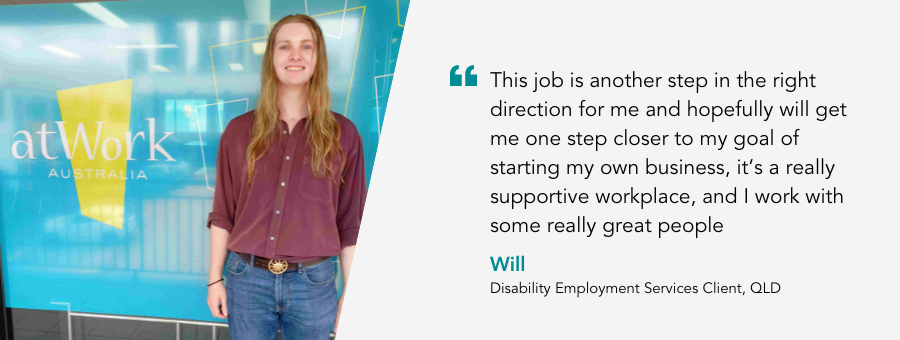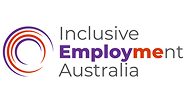
If you live with autism, we can help you find a job that makes the most of your skills, just like Will (image above) a Disability Employment Services client in Queensland, who lives with Autism and ADHD.
Maybe you’re a fast learner or you’re good with people. Perhaps you have a strong can-do attitude or a determined mindset. You could be great at focused tasks or jobs that need a lot of attention to detail.
You may even have a strength you don’t know about yet. Whatever it is, we can get you job-ready, provide support, and find you a job to excel in. In this blog, we will offer tips about gaining and sustaining meaningful employment for people living with autism. You can also learn more about atWork Australia’s support here.
Before applying for work
Map your strengths
A good place to start is understanding your strengths, experiences and how they can be used in a job. A great place to start is drawing up a chart, like the one below, and writing down your strengths, employment experience, abilities, interests and accomplishments.
These are some examples:
| Strengths | Creative | Focussed | Animal caring | Maths |
| Employment | Voluntary work at Launch Housing | Paid work for EY Constructions balancing accounts. | Paid work as a farmhand. | Part-time work as a fitter and turner. |
| Abilities | I can harness a horse. | I can code using HTML. | I can care for the elderly. | I can follow instructions well. |
| Interests | Surfing | Rock-climbing | Gaming | Art |
| Accomplishments | Won the Spelling tournament in 2018. | Awarded best on ground for a local footy competition. | Commended for clearing out horse stables. | Successfully completed apprenticeship in automotive. |
By doing this you will be able to talk to your Job Coach in more detail about what type of work you would like to do and what type of work will suit your skills and interests.
Look at what job descriptions ask for
Once you have established what it is that you would like to do, begin by looking on the internet at websites to understand what jobs are available and what skills they are looking for. Here are some examples;
- Seek – seek.com.au
- Glassdoor – glassdoor.com.au
- CareerOne – careerone.com.au
- Job Search Australia – https://jobsearch.gov.au/
- ArtsHub – artshub.com.au
Craft a professional resume
The resume is a list of your experiences, qualifications and achievements that an employer needs to know. Our atWork Australia team can support people living with autism to write a great resume that stands out from the crowd.
We can assist you with creating a professional looking resume that contains the most relevant information about you, your skills and your abilities.
Your resume should include;
- Your name
- Phone number, email address and the area where you live
- It is recommended to write a short blurb about yourself underneath your name and contact details, for example;
Knowledgeable automotive technician bringing experience from multiple regions. A fast worker who takes pride in completing a job accurately and on time.
Or,
Seeking an apprenticeship in culinary duties for an inclusive organisation.
Or,
My greatest strengths are in fitting and turning. I would hope to advance my skills through working with your team.
- Now list your experiences with the heading ‘Employment History’.
Reach out to someone who can help you find work
An atWork Australia client from Western Australia, Bagus, spoke to his Job Coach about roles in steel fabrication that would interest him. His Job Coach then phoned employers who specialise in steel fabrication, and now he is happy to be making money in a job that he likes.
When you get an interview
Research the company
It is essential to research the company that you are applying for by searching their name on Google. Write down notes about the company such as;
- What their main responsibilities are, e.g., Delivering high quality fresh produce to Australians.
- Their mission statement, e.g., “Fulfilled lives and a strong and inclusive Australia” and write down what you think that means.
- Where are they located and how long will it take you to get to the interview.
Preparing for your interview
atWork Australia is here to support you with your job interview. Speak to your Job Coach if you think a non-traditional job interview may support you to perform you best, such as online, or in a cafe rather than the workplace.
It is also often possible to phone or email an employer before a job interview, which will help you determine what questions the employer will ask, so you can prepare your answers in advance. This will not always be available, but it is unlikely that there will be negative repercussions from asking, and gives you the opportunity to practice and feel comfortable with the questions.
It is also a good way to get to know the employer better and advise them on any essential information about yourself for them to consider.
The day before the job interview
The day before your job interview, read up on your notes and on the morning before, apply relaxation techniques such as slowing your breathing and finding a calm, quite space to not think about anything that would cause distress.
Make sure your clothes are prepared, set out and appropriate for the job you are going for. For example, if it’s an office job that you are applying for, you may wear a collared shirt and smart trousers. However, if it is a job in a factory, closed toe leather shoes. If you take a tour of the factory floor, they make provide you with a hard-hat and high-vis vest to wear for safety.
Your atWork Australia Job Coach may be able to help with uniforms, interview clothes and getting to and from your interview.
Ace your interview
When meeting an employer for the first time, listen carefully to what they are telling you and while it is common practice to look someone in the eye, if this makes you uncomfortable, it’s okay to look away as well.
Try to remain calm, still and try to avoid fidgeting. Although, if this isn’t possible, that’s okay too.
Talk about yourself, you can talk about what modifications or flexibility you might need to perform your best on the job (such as a quieter space) but, remain positive and avoid any negative thoughts or conversations.
Try to use similar words or sentences from the job advertisement and relate these words with something about your previous experience.
Wait for the employer to guide the conversation and speak clearly and calmly when you respond. It is normal to feel nervous in a job interview but sometimes, people can mumble or speak too fast as a result of their nervousness. Remember to slow down your breathing and be clear with your words.
Questions to ask the employer in the interview could include;
- What is the workplace culture like?
- What are the goals of the company?
- What are the biggest challenges with the role?
- Have you worked with anyone living with autism?
- Are you prepared to modify the workplace to assist me?
- Do you need any more information?
After the interview, always thank the interviewer for their time. You may say something like, “Thank you for your time, it’s been great to talk to you and I hope to hear from you again.”
Some companies may choose to interview you more than once. This is a very good indication that they are interested in you for employment, however, you haven’t got the job yet. They just want to know more about your skills, experiences and abilities.
You may make contact with the employer after your interview via phone or email to show that you’re keen for the job and that you appreciated their time.
When you land the job
This is a good time to be proud of yourself and your amazing achievement.
Use the day before you start your role to plan. Use Google Maps to help you work out how to get to the location whether it’s by public transport or by car.
Make sure you start the day early. Take snacks, water, a notepad to write down the names of your colleagues, passwords and seating arrangements.
Remember to steady your breathing and be kind to yourself.
After the shift, you may feel exhausted, that’s normal. Discuss your day with a friend or simply have some quite time to yourself.
Employment is not only a great way to make money to buy the things you want and apply your skills and talents in the workforce, but it is also a place where you can learn new skills and develop lasting relationships with people.
Works for everyone
Here at atWork Australia, we believe that everyone deserves the opportunity to enjoy meaningful work. We’d love to tell you more about how we support people living with autism to find good work, and answer any questions you may have. Please call us on 1300 080 856 or send an email to contactDES@atworkaustralia.com.au and let’s find you a job that suits your strengths.


